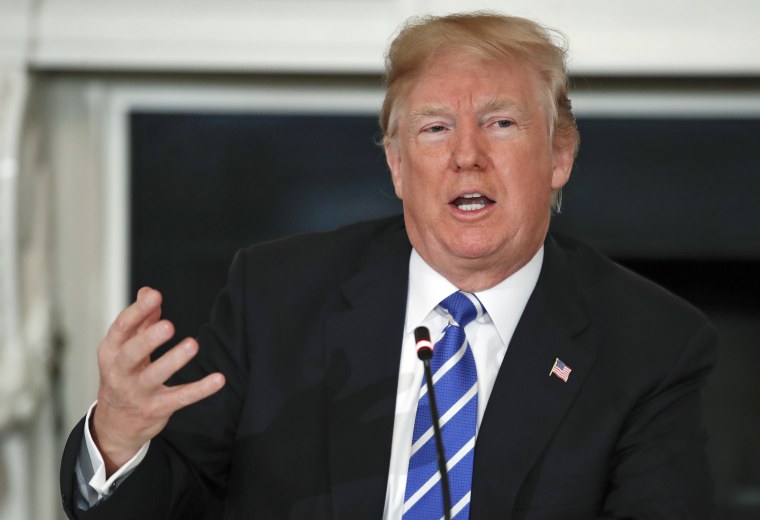WASHINGTON — The White House's 2019 budget, released Monday, would ramp up spending on the military, a new border wall and fighting the opioid epidemic while making big reductions in entitlement spending.
"[F]und what we must, cut where we can, and reduce what we borrow," Office of Management and Budget Director Mick Mulvaney said of the 2019 budget (full document here) in a statement Sunday night, likening the U.S. government's choices to that of an American family's. The administration's budget evidences the priorities of the Trump administration, though it will likely amount to little more than a public wish list of Trump's agenda.
Mulvaney, speaking to reporters in the White House briefing room, referred to executive budgets as "messaging" documents. The message this year, he said, was that Congress doesn't "have to spend all of this money...but if you do, here is how we would prefer to see you spend it" and an optimistic riff that "we do not have to have trillion dollar deficits forever."
But Trump's proposal does run up the deficit, breaking with the deep-rooted conservative tradition of projecting long-term balanced budgets (or at least trying to). The 2019 budget plan does push for $3.6 trillion in savings over 10 years, while serving up cuts to departments like State, Labor, Housing and Urban Development and the Environmental Protection Agency while bolstering spending for Homeland Security, Veterans Affairs, and the Department of Defense.
The budget boosts spending for what the plan calls a "lethal, resilient, and agile" military, while making significant cuts to domestic entitlement programs like Medicare, Medicaid, and the food aid program SNAP. Public broadcasting also finds itself in the crosshairs once again, with the administration seeking to slash more than 95 percent of the funding it was allocated in 2017.
Despite the high tab, Mulvaney — who said Monday afternoon he still thought of himself as a "deficit hawk" — told reporters he "probably could've made" the budget balance, "but you all would've rightly absolutely excoriated us for using funny numbers to do it."
The 2019 Trump budget puts dollar signs next to key elements of the president's own priorities list, including $18 billion for a wall along the Southern border, $200 billion for infrastructure spending and billions to combat the opioid epidemic.
The plan would put $200 billion in federal funding toward the administration's proposed $1.5 trillion infrastructure effort, a proposal that relies heavily on public-private partnerships and asks states and local governments to spur action on infrastructure in their communities. The 2019 budget released Monday asks for $21 billion "to jump-start key elements" on the infrastructure initiative. The White House released the infrastructure proposal in tandem with the budget plan on Monday.
The budget plan also asks for $23 billion in border security and immigration enforcement at what Mulvaney called "our porous southern border" — with $782 million for 2,750 additional law enforcement officers and agents at U.S. Customs and Border Protection and U.S. Immigration and Customs Enforcement in 2019, in addition to funding for the long-promised border wall.
While some of the White House's immigration goals are directly funded in this proposal, it still leaves open the question vexing Washington: what to do about so-called "Dreamers," people who were brought to the United States illegally as children and protected by a now ended, Obama-era law protecting them from deportation.
Trump didn't "want DACA in the budget," he said Monday, as he called for a separately brokered deal between lawmakers on Capitol Hill and the White House. But Mulvaney repeatedly told reporters hours later that the administration's numbers were crunched with a deal on DACA in mind.
"Opioid-related spending" makes up nearly $17 billion in the administration's 2019 budget, the OMB outlined, with $13 billion marked for the Department of Health and Human Services over the next two years "to combat the opioid epidemic by expanding access to prevention, treatment and recovery support services, as well as support for mental health."
Trump's budget last year came under fire from some in his own party for proposing drastic cuts in State Department funding, and for not suggesting a bigger spending increase for the Department of Defense.
This year, the plan would allocate big dollars for the military and veterans programs, with a proposed $716 billion directed toward national defense spending.
Before the budget was released on Monday, Trump said that it would take "care of the military like never before," and told reporters in the White House State Dining Room that Defense Secretary James Mattis had called him to say "wow" because they'd never expected to get so much money.
